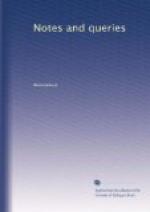A. DE MORGAN.
October 14. 1850.
* * * * * {329}
SHAKSPEARE’S USE OF THE WORD “DELIGHTED.”
(Vol. ii., pp. 113. 139. 200. 234.)
I should have been content to leave the question of the meaning of the word delighted as it stands in your columns, my motive, so kindly appreciated by Mr. SINGER, in raising the discussion being, by such means to arrive at the true meaning of the word, but that the remarks of L.B.L. (p. 234.) recall to my mind a canon of criticism which I had intended to communicate at an earlier period as useful for the guidance of commentators in questions of this nature. It is as follows:—Master the grammatical construction of the passage in question (if from a drama, in its dramatic and I scenic application), deducing therefrom the general sense, before you attempt to amend or fix the meaning of a doubtful word.
Of all writers, none exceed Shakspeare in logical correctness and nicety of expression. With a vigour of thought and command of language attained by no man besides, it is fair to conclude, that he would not be guilty of faults of construction such as would disgrace a school-boy’s composition; and yet how unworthily is he treated when we find some of his finest passages vulgarised and degraded through misapprehensions arising from a mere want of that attention due to the very least, not to say the greatest, of writers. This want of attention (without attributing to it such fatal consequences) appears to me evident in L.B.L.’s remarks, ably as he analyses the passage. I give him credit for the faith that enabled him to discover a sense in it as it stands; but when he says that it is perfectly intelligible in its natural sense, it appears to me that he cannot be aware of the innumerable explanations that have been offered of this very clear passage. The source of his error is plainly referable to the cause I have pointed out.
It is quite true that, in the passage referred to, the condition of the body before and after death is contrasted, but this is merely incidental. The natural antithesis of “a sensible warm motion” is expressed in “a kneaded clod” and “cold obstruction;” but the terms of the other half of the passage are not quite so well balanced. On the other hand, it is not the contrasted condition of each, but the separation of the body and spirit—that is, death—which is the object of the speaker’s contemplation. Now with regard to the meaning of the term delighted, L.B.L. says it is applied to the spirit “not in its state after death, but during life.” I must quote the lines once more:—




